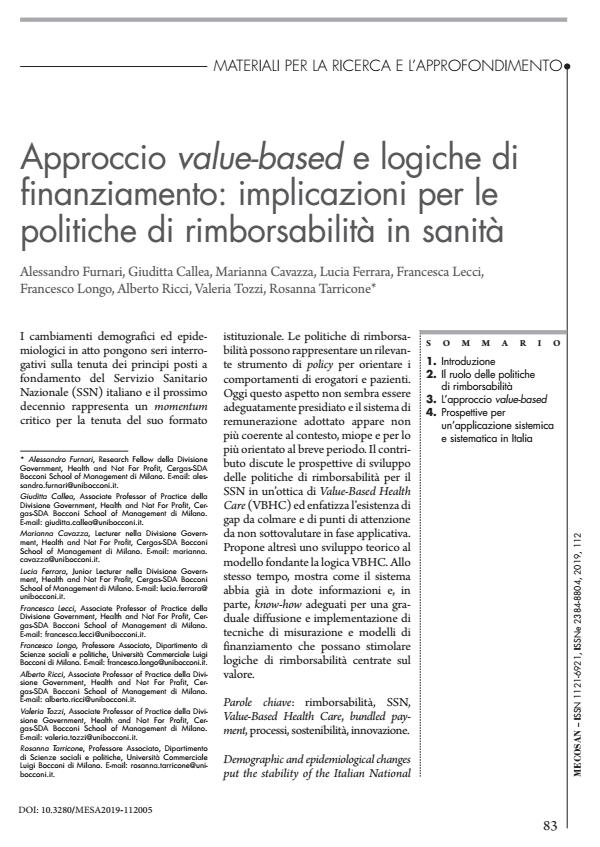Approccio value-based e logiche di finanziamento: implicazioni per le politiche di rimborsabilità in sanità
Journal title MECOSAN
Author/s Alessandro Furnari, Giuditta Callea, Marianna Cavazza, Lucia Ferrara, Francesca Lecci, Francesco Longo, Alberto Ricci, Valeria Tozzi, Rosanna Tarricone
Publishing Year 2020 Issue 2019/112
Language Italian Pages 19 P. 83-101 File size 614 KB
DOI 10.3280/MESA2019-112005
DOI is like a bar code for intellectual property: to have more infomation
click here
Below, you can see the article first page
If you want to buy this article in PDF format, you can do it, following the instructions to buy download credits

FrancoAngeli is member of Publishers International Linking Association, Inc (PILA), a not-for-profit association which run the CrossRef service enabling links to and from online scholarly content.
Demographic and epidemiological changes put the stability of the Italian National Health Service (INHS) principles under pressure and the next decade will represent a critical momentum for keeping and reinforcing its institutional format. Reimbursement schemes could represent an important policy tool to orient providers and patients’ behaviour. Nowadays, these schemes do not seem to be adequately designed and the remuneration system appears too oriented to the short term and no longer consistent with the context. This article discusses the development possibilities of reimbursement policies for the INHS in a Value-Based Health Care (VBHC) perspective and highlights gaps to be filled that should not be underestimated in the implementation phase. The article also extends the existing theoretical framework for VBHC. At the same time, it underlines how the Italian healthcare system already has adequate information and knowhow for a gradual dissemination of measurement techniques and financing models that can stimulate a reimbursement approach centred on creating value.
Keywords: Reimbursement, NHS, Value- Based Health Care, bundled payment, processes, sustainability, innovation.
Alessandro Furnari, Giuditta Callea, Marianna Cavazza, Lucia Ferrara, Francesca Lecci, Francesco Longo, Alberto Ricci, Valeria Tozzi, Rosanna Tarricone, Approccio value-based e logiche di finanziamento: implicazioni per le politiche di rimborsabilità in sanità in "MECOSAN" 112/2019, pp 83-101, DOI: 10.3280/MESA2019-112005